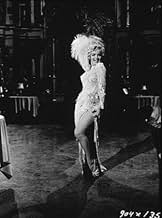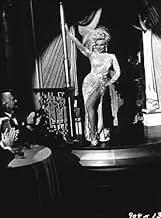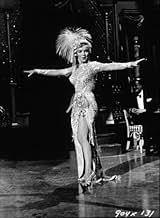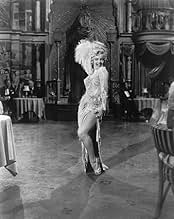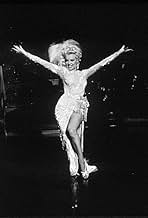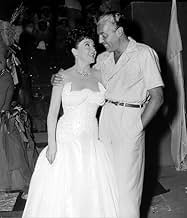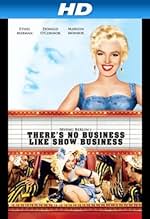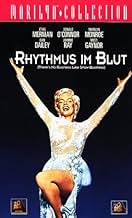NOTE IMDb
6,4/10
7,1 k
MA NOTE
Ajouter une intrigue dans votre langueMolly and Terry Donahue, plus their three children, are The Five Donahues. Son Tim meets hat-check girl Vicky and the family act begins to fall apart.Molly and Terry Donahue, plus their three children, are The Five Donahues. Son Tim meets hat-check girl Vicky and the family act begins to fall apart.Molly and Terry Donahue, plus their three children, are The Five Donahues. Son Tim meets hat-check girl Vicky and the family act begins to fall apart.
- Réalisation
- Scénario
- Casting principal
- Nommé pour 3 Oscars
- 4 nominations au total
Dorothy Abbott
- Showgirl
- (non crédité)
Dorothy Adams
- Nurse
- (non crédité)
Robert Adler
- Night Watchman
- (non crédité)
Aladdin
- Orchestra Violinist
- (non crédité)
Fred Aldrich
- Private Detective
- (non crédité)
Avis à la une
There are two main types of musicals--those where the emphasis is clearly on the music and others where the music is incidental to the story. While which style you like is up to you, for me, I much prefer those with less music--where the story is predominant. So, because of my personal preference, movies like "There's No Business Like Show Business" are NOT exactly my cup of tea, so to speak.
The film is about a fictional show business family, the Donohues. When the film begins, the three children are young. But then through the miracle of movie magic, soon about 15-20 years pass--and the children are now grown (and include Donald O'Connor and Mitzi Gaynor). Oddly, the parents, Dan Dailey and Ethel Merman, didn't seem to age a day. Even more noticeable is Marilyn Monroe--you see her early in the film and after all those years she looks as if she hasn't aged a day. Even if it was only 10 years--still, she looked EXACTLY the same! While the film follows the family with their ups and downs (and the third child when he decides to become a priest), all of it seems to be there just to provide a chance to sing and dance...a lot. Many of the songs are very familiar. Overall, very glossy and enjoyable if all you want is lots of singing and dancing...which I didn't. Watchable for a guy like me, but only just, as the story didn't seem strong enough to handle all the songs.
The film is about a fictional show business family, the Donohues. When the film begins, the three children are young. But then through the miracle of movie magic, soon about 15-20 years pass--and the children are now grown (and include Donald O'Connor and Mitzi Gaynor). Oddly, the parents, Dan Dailey and Ethel Merman, didn't seem to age a day. Even more noticeable is Marilyn Monroe--you see her early in the film and after all those years she looks as if she hasn't aged a day. Even if it was only 10 years--still, she looked EXACTLY the same! While the film follows the family with their ups and downs (and the third child when he decides to become a priest), all of it seems to be there just to provide a chance to sing and dance...a lot. Many of the songs are very familiar. Overall, very glossy and enjoyable if all you want is lots of singing and dancing...which I didn't. Watchable for a guy like me, but only just, as the story didn't seem strong enough to handle all the songs.
The film was, perhaps, the splashiest of the year's musicals
It dealt with the joys, loves and heartaches experienced by a vaudeville family called the Donahues (spending their lives singing and dancing and touring) with Merman and Dailey as mother and father, and Ray, Gaynor and O'Connor as their talented offspring
All of them get to perform a large catalog of new and old songs by Irving Berlin in sumptuous arrangements, beautiful settings and on a big Hippodrome extravaganza
Daily and Merman hit the top; O'Connorwho had liked to build a barbed-wire fence around Marilyndid it Scottish and came with some fine dances; Gaynor's love was dancing and she was really cute; and while Ray got some thinking to do, he sells a very beautiful song ("If You Believe").
Marilyn (appearing after 29 minutes screening) was deliciously charming, seducing and very appealing She sang "After You Get What You Want" and "Lazy," and did that tropical version of 'Heat Wave.'
All of them get to perform a large catalog of new and old songs by Irving Berlin in sumptuous arrangements, beautiful settings and on a big Hippodrome extravaganza
Daily and Merman hit the top; O'Connorwho had liked to build a barbed-wire fence around Marilyndid it Scottish and came with some fine dances; Gaynor's love was dancing and she was really cute; and while Ray got some thinking to do, he sells a very beautiful song ("If You Believe").
Marilyn (appearing after 29 minutes screening) was deliciously charming, seducing and very appealing She sang "After You Get What You Want" and "Lazy," and did that tropical version of 'Heat Wave.'
There's No Business Like Show Business has the distinction of being the last of the Irving Berlin songbook musicals filmed. It came out the same year as White Christmas, also of the same genre.
Take a listen to the background music of films like Holiday Inn, Blue Skies, Alexander's Ragtime Band, and this one. I defy you to find one non-Berlin note in the film and that's no accident. The more songs of Irving Berlin used, the more money he made. He was one shrewd businessman Irving, most of the time.
The title song is identified with Ethel Merman and it was introduced in Annie Get Your Gun. Merman like Mary Martin had a conspicuous lack of success in Hollywood as much as she was an icon on Broadway. She only did the screen version of two of her Broadway hits, Anything Goes and Call Me Madam. That's two more than Mary Martin did.
Anyway, I think the genesis of There's No Business Like Show Business probably came about when Call Me Madam became such a hit and the movie money people saw how the chemistry was between her and Donald O'Connor. So O'Connor was signed to play one of her three children. The other two children were Johnnie Ray and Mitzi Gaynor.
The plot such as it is, is the story of the Donahue family between both World Wars. The father of the aforementioned children is Dan Dailey and he and Merman do some good Irving Berlin numbers together. I've always marvelled at how graceful Dan Dailey moved on the screen in his musical films. He was not a creative sort in the same way Fred Astaire or Gene Kelly were. Probably if he had been, his reputation would be higher today. But he was a pleasing entertainer every time you saw him.
By all accounts it wasn't a happy film for Ethel. Marilyn Monroe is in the film and Ethel was jealous of her. Not that Monroe wasn't her usual difficult self. Probably that helped the plot because it does call for the two to be at odds. Merman believes that Monroe has led Donald O'Connor astray.
Mitzi Gaynor was a wonderful talent as well. Too bad she wasn't born twenty years earlier, what a big star she would have been in the thirties and forties in Hollywood musicals then. Good singer and one fabulous dancer.
The plot does get kind of sticky in spots and Johnnie Ray didn't set the screen on fire when he wasn't singing. No accident he didn't become a film star.
Still for those of us who bless the day Irving Berlin put down his first notes of an original song, it's worth watching.
Take a listen to the background music of films like Holiday Inn, Blue Skies, Alexander's Ragtime Band, and this one. I defy you to find one non-Berlin note in the film and that's no accident. The more songs of Irving Berlin used, the more money he made. He was one shrewd businessman Irving, most of the time.
The title song is identified with Ethel Merman and it was introduced in Annie Get Your Gun. Merman like Mary Martin had a conspicuous lack of success in Hollywood as much as she was an icon on Broadway. She only did the screen version of two of her Broadway hits, Anything Goes and Call Me Madam. That's two more than Mary Martin did.
Anyway, I think the genesis of There's No Business Like Show Business probably came about when Call Me Madam became such a hit and the movie money people saw how the chemistry was between her and Donald O'Connor. So O'Connor was signed to play one of her three children. The other two children were Johnnie Ray and Mitzi Gaynor.
The plot such as it is, is the story of the Donahue family between both World Wars. The father of the aforementioned children is Dan Dailey and he and Merman do some good Irving Berlin numbers together. I've always marvelled at how graceful Dan Dailey moved on the screen in his musical films. He was not a creative sort in the same way Fred Astaire or Gene Kelly were. Probably if he had been, his reputation would be higher today. But he was a pleasing entertainer every time you saw him.
By all accounts it wasn't a happy film for Ethel. Marilyn Monroe is in the film and Ethel was jealous of her. Not that Monroe wasn't her usual difficult self. Probably that helped the plot because it does call for the two to be at odds. Merman believes that Monroe has led Donald O'Connor astray.
Mitzi Gaynor was a wonderful talent as well. Too bad she wasn't born twenty years earlier, what a big star she would have been in the thirties and forties in Hollywood musicals then. Good singer and one fabulous dancer.
The plot does get kind of sticky in spots and Johnnie Ray didn't set the screen on fire when he wasn't singing. No accident he didn't become a film star.
Still for those of us who bless the day Irving Berlin put down his first notes of an original song, it's worth watching.
When Darryl F. Zanuck virtually forced exhibitors and most of his fellow studio mogul rivals to adopt CinemaScope as a panacea for TV's devastation of Hollywood's weekly box office bonanza, he dictated that virtually all of Twentieth's output was to be filmed in that eye-stretching process. "There's No Business Like Show Business," directed by that old pro, Walter Lang, seems to be the prime example of Darryl's minions saying to their boss: "You want wide? We'll give you W-I-D-E!!"
Everything about it was designed and lensed to emphasize the original ratio of the CinemaScope process and viewing it on a video that isn't letterboxed must look like what a one-eyed person must experience in everyday life. I never did see it in a theater but I have seen it on a TV broadcast which more-or-less recreated its widescreen ratio. It's a glorious mish-mash. Every Berlin tune that could be stuffed into it is given at least one run-through; John de Cuir's production design must have occupied every inch of several of Twentieth's West Los Angeles soundstages; Ethel Merman, after her terrific movie repeat of her Broadway success in "Call Me Madam" for Fox (and now, as of 2005, available on video), trumpets away in number after number (Must have been an ear-rending experience over those original four-track stereophonic sound systems.); Dan Dailey, Donald O'Connor and Mitzi Gaynor give it their energetic best; and then there's Marilyn. What can we say, with all that so sadly, in her personal life, came after she reluctantly fulfilled her contractual obligation in this one? She dazzles in, let's face it, a rather vulgar way, and seems shoehorned in to boost the potential box office. And they even added Johnnie Ray, a huge jukebox success at the time (and, due to his hearing deficiency, performing his songs at an even greater volume than La Merman.)
All in all this one shouldn't be missed if you want to view an example of Hollywood at its brassiest, in a production fairly bulging with elements that may not coalesce very harmoniously but which was, no doubt, worth the price of admission to those movie palaces before they were carved up to become the precursors of today's sterile multiplexes.
Everything about it was designed and lensed to emphasize the original ratio of the CinemaScope process and viewing it on a video that isn't letterboxed must look like what a one-eyed person must experience in everyday life. I never did see it in a theater but I have seen it on a TV broadcast which more-or-less recreated its widescreen ratio. It's a glorious mish-mash. Every Berlin tune that could be stuffed into it is given at least one run-through; John de Cuir's production design must have occupied every inch of several of Twentieth's West Los Angeles soundstages; Ethel Merman, after her terrific movie repeat of her Broadway success in "Call Me Madam" for Fox (and now, as of 2005, available on video), trumpets away in number after number (Must have been an ear-rending experience over those original four-track stereophonic sound systems.); Dan Dailey, Donald O'Connor and Mitzi Gaynor give it their energetic best; and then there's Marilyn. What can we say, with all that so sadly, in her personal life, came after she reluctantly fulfilled her contractual obligation in this one? She dazzles in, let's face it, a rather vulgar way, and seems shoehorned in to boost the potential box office. And they even added Johnnie Ray, a huge jukebox success at the time (and, due to his hearing deficiency, performing his songs at an even greater volume than La Merman.)
All in all this one shouldn't be missed if you want to view an example of Hollywood at its brassiest, in a production fairly bulging with elements that may not coalesce very harmoniously but which was, no doubt, worth the price of admission to those movie palaces before they were carved up to become the precursors of today's sterile multiplexes.
Contrary to what a lot of people seem to think of this film, my biggest complaint with it is Marilyn Monroe. The studio shoehorned her into this film in their attempt to make the biggest musical extravaganza ever, and she just doesn't fit. She's so out of sync with the other characters that she might as well be from a different planet.
Don't get me wrong. I'm not a huge Marilyn fan, but she was good (and well-cast) in "Some Like It Hot". She's just all wrong for "No Business Like Show Business", and she looks and sounds ridiculous.
To be fair, Johnnie Ray often doesn't hold up well before modern audiences, either, when he sings. It's not that he's bad; it's that his style has come and gone and hardly been seen since. Everything in this movie tends to be at least a little overdone, and asking Johnnie Ray to exaggerate his singing does not produce flattering results.
Still, Donald O'Connor and Mitzi Gaynor are as brilliant and exuberant as you could hope. Ethel Merman is, well, Ethel Merman, and exactly right for her part. Dan Dailey is like a reliable locomotive that never disappoints.
The story is a bit plodding at times, but it only exists to set up one gala musical number after another. It only really bogs down when it gets caught up with Marilyn's character. If the studio had just left Marilyn out of it, perhaps giving Mitzi Gaynor the love interest role, and toned down the general effort level just a hair, this would've been one of the all-time greats.
It's still absolutely worth seeing -- in widescreen format, if you possibly can.
Don't get me wrong. I'm not a huge Marilyn fan, but she was good (and well-cast) in "Some Like It Hot". She's just all wrong for "No Business Like Show Business", and she looks and sounds ridiculous.
To be fair, Johnnie Ray often doesn't hold up well before modern audiences, either, when he sings. It's not that he's bad; it's that his style has come and gone and hardly been seen since. Everything in this movie tends to be at least a little overdone, and asking Johnnie Ray to exaggerate his singing does not produce flattering results.
Still, Donald O'Connor and Mitzi Gaynor are as brilliant and exuberant as you could hope. Ethel Merman is, well, Ethel Merman, and exactly right for her part. Dan Dailey is like a reliable locomotive that never disappoints.
The story is a bit plodding at times, but it only exists to set up one gala musical number after another. It only really bogs down when it gets caught up with Marilyn's character. If the studio had just left Marilyn out of it, perhaps giving Mitzi Gaynor the love interest role, and toned down the general effort level just a hair, this would've been one of the all-time greats.
It's still absolutely worth seeing -- in widescreen format, if you possibly can.
Le saviez-vous
- AnecdotesOne day, Marilyn Monroe's husband, Joe DiMaggio, visited the set. He refused to be photographed with Monroe, but insisted on being photographed with Ethel Merman, whom he called "my favorite star."
- GaffesDuring the "Heat Wave" number, Marilyn Monroe accidentally pokes her finger in the eye of a dancer standing between the branches of a prop tree.
- Citations
Molly Donahue: "Don't worry." Hmm. That's a laugh. You start worrying about your kids the day they're born and you never stop. Even after they bury you, I bet you never stop.
- ConnexionsFeatured in Marilyn (1963)
- Bandes originalesWhen the Midnight Choo-Choo Leaves for Alabam'
(uncredited)
Written by Irving Berlin
Performed by Ethel Merman and Dan Dailey
Later performed by Mitzi Gaynor and Donald O'Connor
Meilleurs choix
Connectez-vous pour évaluer et suivre la liste de favoris afin de recevoir des recommandations personnalisées
- How long is There's No Business Like Show Business?Alimenté par Alexa
Détails
- Date de sortie
- Pays d’origine
- Langues
- Aussi connu sous le nom de
- El mundo de la fantasía
- Lieux de tournage
- Société de production
- Voir plus de crédits d'entreprise sur IMDbPro
Box-office
- Montant brut mondial
- 6 341 $US
- Durée
- 1h 57min(117 min)
- Couleur
- Rapport de forme
- 2.55 : 1
Contribuer à cette page
Suggérer une modification ou ajouter du contenu manquant



